Raevenlord
News Editor
- Joined
- Aug 12, 2016
- Messages
- 3,755 (1.23/day)
- Location
- Portugal
| System Name | The Ryzening |
|---|---|
| Processor | AMD Ryzen 9 5900X |
| Motherboard | MSI X570 MAG TOMAHAWK |
| Cooling | Lian Li Galahad 360mm AIO |
| Memory | 32 GB G.Skill Trident Z F4-3733 (4x 8 GB) |
| Video Card(s) | Gigabyte RTX 3070 Ti |
| Storage | Boot: Transcend MTE220S 2TB, Kintson A2000 1TB, Seagate Firewolf Pro 14 TB |
| Display(s) | Acer Nitro VG270UP (1440p 144 Hz IPS) |
| Case | Lian Li O11DX Dynamic White |
| Audio Device(s) | iFi Audio Zen DAC |
| Power Supply | Seasonic Focus+ 750 W |
| Mouse | Cooler Master Masterkeys Lite L |
| Keyboard | Cooler Master Masterkeys Lite L |
| Software | Windows 10 x64 |
Benchmarks have leaked on AMD's upcoming Ryzen CPUs, and if accurate, these are the ones that will change the name of the game from "Hype Train" to "Reality Check". Part of a verified Passmark entry, the test system consisted of an AMD Ryzen 8-core, 16-thread ES clocked at 3.4 GHz (which puts it closely on the Ryzen 7 1700X territory, though it isn't known whether Turbo to its rated 3.8 GHz was active or not), seated on an entry-level MSI A320 AM4 motherboard (absent of overclocking functionality) and 16GB of 2400MHz DDR4 memory.
The tests include integer math, floating point performance, prime numbers, encryption, compression, sorting, SSE performance and physics. The AMD Ryzen 7 1700X outperformed every other CPU in 5 out of the 8 tests, including Intel's fastest 8-core chip, the $1099 Broadwell-E i7 6900K. When put side by side against Intel's slightly less expensive $999 8 core extreme edition Haswell-E i7 5960X, Ryzen was faster in 6 out of the 8 tests. The 1700X showed particularly good performance in integer math and encryption, workloads typically associated with server workloads (and where the bulk of the profit is).
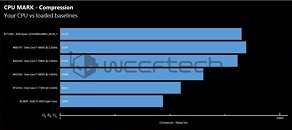
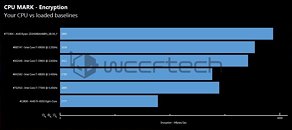
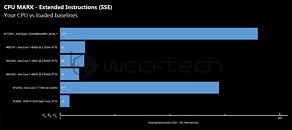
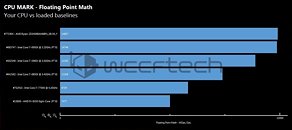
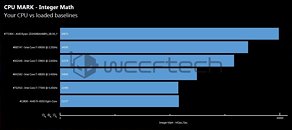
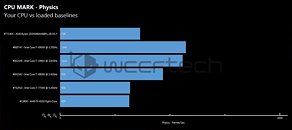
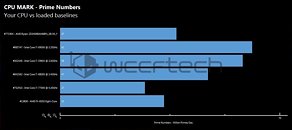
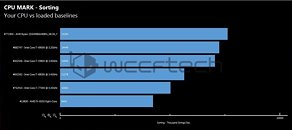
The average aggregate core Coming in at roughly 4% behind the i7-5960X and 9% behind the i7-6900K - both of which retail for more than double the pre-order price for the 1700X of $389. Consider that this isn't even the highest-clocked Ryzen CPUs about to hit retail, and things look rather good for AMD.
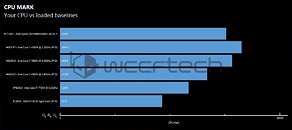
Moving on from the multi-threaded benchmarks, Passmark's single-threaded performance test is probably the most interesting one, due to AMD's recent inability to go toe to toe against Intel in single-core performance. This here was definitely the uphill battle for the company, and it would actually seem that Jim Keller and company have managed to do what might seem impossible, simply by looking at AMD's R&D budget deficit compared to its Goliath of an adversary in Intel. Whether or not the sample is running at stock 3.4 GHz sans Turbo (mightily impressive), or at the retail 1700 X's 3.8 GHz Turbo speed (still very impressive), the sample manages to successfully edge out the 5960X and the 6800K, falling behind the 6900K by no more than 3%. That's a very impressive feat, especially when one considers that Intel's i7-6900K and i7-6800K can Turbo up to 4.0GHz and 3.8GHz respectively in single-threaded mode, thanks to Broadwell-E's Turbo Boost 3.0 feature. This means that even if the Ryzen engineering sample was in fact running at 3.8GHz Turbo frequency, it would still be outperforming Broadwell-E clock for clock ever so slightly.
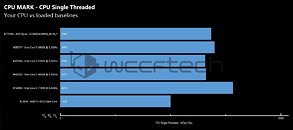
Only Intel's i7-7700K Kaby Lake with its 4.5 GHz Turbo manages to distance itself from the 1700X - a 91W 4-core going up against an 8-core chip, rated at only 4 watts higher at 95 W (rated; the jury is still out on real-world testing). And the power efficiency equation gets even more interesting (just not to Intel) when you consider that this Ryzen chip manages to come in at less 45 W TDP than Intel's 140 W i7-6900K. It would appear that AMD really did strike gold with the balance of features and power consumption, as well as multi and single-core performance.
If these benchmarks are real, the hype train has actually just vanished in smoke. Now it's called the Ryzen line, and it most likely represents a much-awaited supply train for AMD's pockets.
View at TechPowerUp Main Site
The tests include integer math, floating point performance, prime numbers, encryption, compression, sorting, SSE performance and physics. The AMD Ryzen 7 1700X outperformed every other CPU in 5 out of the 8 tests, including Intel's fastest 8-core chip, the $1099 Broadwell-E i7 6900K. When put side by side against Intel's slightly less expensive $999 8 core extreme edition Haswell-E i7 5960X, Ryzen was faster in 6 out of the 8 tests. The 1700X showed particularly good performance in integer math and encryption, workloads typically associated with server workloads (and where the bulk of the profit is).








The average aggregate core Coming in at roughly 4% behind the i7-5960X and 9% behind the i7-6900K - both of which retail for more than double the pre-order price for the 1700X of $389. Consider that this isn't even the highest-clocked Ryzen CPUs about to hit retail, and things look rather good for AMD.

Moving on from the multi-threaded benchmarks, Passmark's single-threaded performance test is probably the most interesting one, due to AMD's recent inability to go toe to toe against Intel in single-core performance. This here was definitely the uphill battle for the company, and it would actually seem that Jim Keller and company have managed to do what might seem impossible, simply by looking at AMD's R&D budget deficit compared to its Goliath of an adversary in Intel. Whether or not the sample is running at stock 3.4 GHz sans Turbo (mightily impressive), or at the retail 1700 X's 3.8 GHz Turbo speed (still very impressive), the sample manages to successfully edge out the 5960X and the 6800K, falling behind the 6900K by no more than 3%. That's a very impressive feat, especially when one considers that Intel's i7-6900K and i7-6800K can Turbo up to 4.0GHz and 3.8GHz respectively in single-threaded mode, thanks to Broadwell-E's Turbo Boost 3.0 feature. This means that even if the Ryzen engineering sample was in fact running at 3.8GHz Turbo frequency, it would still be outperforming Broadwell-E clock for clock ever so slightly.

Only Intel's i7-7700K Kaby Lake with its 4.5 GHz Turbo manages to distance itself from the 1700X - a 91W 4-core going up against an 8-core chip, rated at only 4 watts higher at 95 W (rated; the jury is still out on real-world testing). And the power efficiency equation gets even more interesting (just not to Intel) when you consider that this Ryzen chip manages to come in at less 45 W TDP than Intel's 140 W i7-6900K. It would appear that AMD really did strike gold with the balance of features and power consumption, as well as multi and single-core performance.
If these benchmarks are real, the hype train has actually just vanished in smoke. Now it's called the Ryzen line, and it most likely represents a much-awaited supply train for AMD's pockets.
View at TechPowerUp Main Site









 ).
).